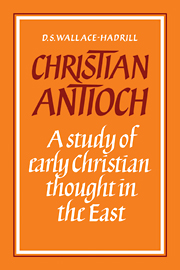Book contents
- Frontmatter
- Contents
- Foreword
- Abbreviations
- Introduction: survey of the history of Antioch
- 1 The religious background to Antiochene Christianity: pagan, Jewish, gnostic
- 2 The interpretation of the biblical record
- 3 Historiography in the Eastern Church
- 4 The doctrine of the nature of God
- 5 The use of Greek philosophy by the Eastern Church
- 6 The human experience of Christ and the salvation of man
- 7 Antiochene theology and the religious life
- Appendix 1 Eastern representation at Nicaea
- Appendix 2 The feminine element in Syrian Christianity
- Notes
- Bibliography
- Index
2 - The interpretation of the biblical record
Published online by Cambridge University Press: 03 May 2010
- Frontmatter
- Contents
- Foreword
- Abbreviations
- Introduction: survey of the history of Antioch
- 1 The religious background to Antiochene Christianity: pagan, Jewish, gnostic
- 2 The interpretation of the biblical record
- 3 Historiography in the Eastern Church
- 4 The doctrine of the nature of God
- 5 The use of Greek philosophy by the Eastern Church
- 6 The human experience of Christ and the salvation of man
- 7 Antiochene theology and the religious life
- Appendix 1 Eastern representation at Nicaea
- Appendix 2 The feminine element in Syrian Christianity
- Notes
- Bibliography
- Index
Summary
Išo'dad of Merv, a ninth-century Nestorian bishop, commenting on the creation narrative in Genesis, writes, ‘It is necessary to know that first Origen, and after him Basil and others, have claimed that the waters above the firmament are spiritual powers.’ What is noteworthy about this comment is that Išo'dad, in tracing the course of a piece of biblical interpretation which he regards as mistaken, should find its source in Origen, six centuries before his own date. Such was the power of Origen that he could still, so long afterwards, be identified as the originator of the type of exegesis that the Antiochenes regarded as being at least dangerous: that is, the use of a biblical text as a springboard from which to leap to higher and more spiritual meanings than might appear on the surface of the text.
Origen had not in fact invented this practice. The Homeric myths had been subjected to this treatment and Philo of Alexandria had habitually treated the Jewish Scriptures in this way, giving the narratives a new lease of life. Philo, however, hardly treated his search for spiritual meaning in Scripture as but one element in a great system, as Origen came to do. In Christian exegesis, Justin, Irenaeus and Clement of Alexandria had paved the way for Origen. He sometimes gives the impression that incidental difficulties in the biblical text oblige him to treat it in a non-literal, nonhistorical fashion. Thus he finds it necessary to treat contradictions between the gospels as matter for spiritual interpretation, and suggests that the biblical writers could falsify historical fact in order to bring out the spiritual significance of an event or situation.
- Type
- Chapter
- Information
- Christian AntiochA Study of Early Christian Thought in the East, pp. 27 - 51Publisher: Cambridge University PressPrint publication year: 1982

